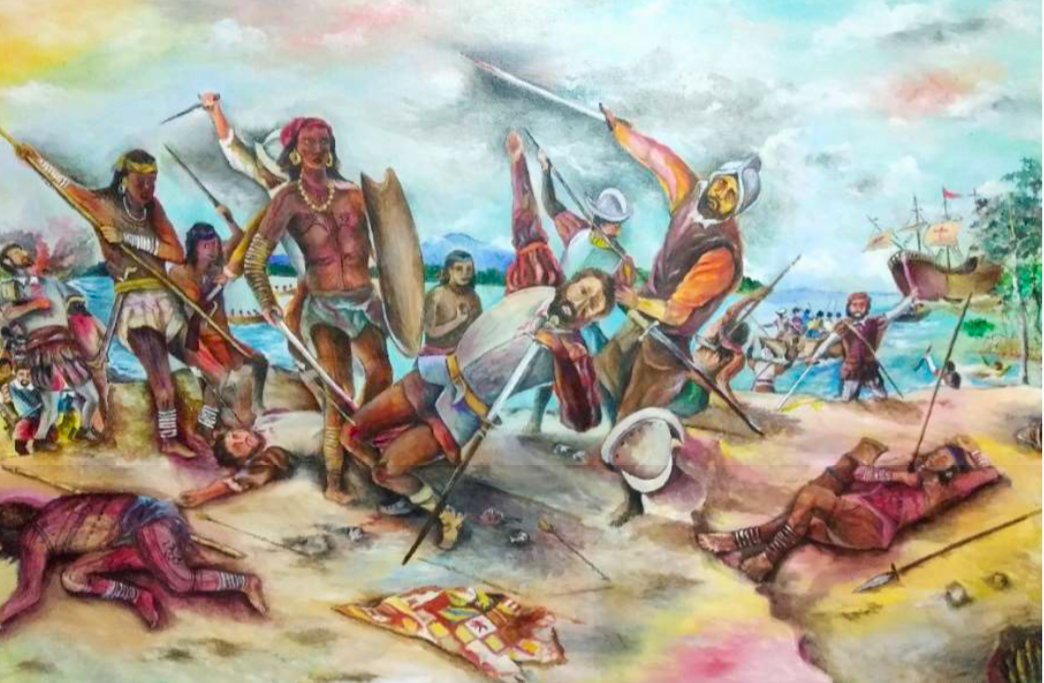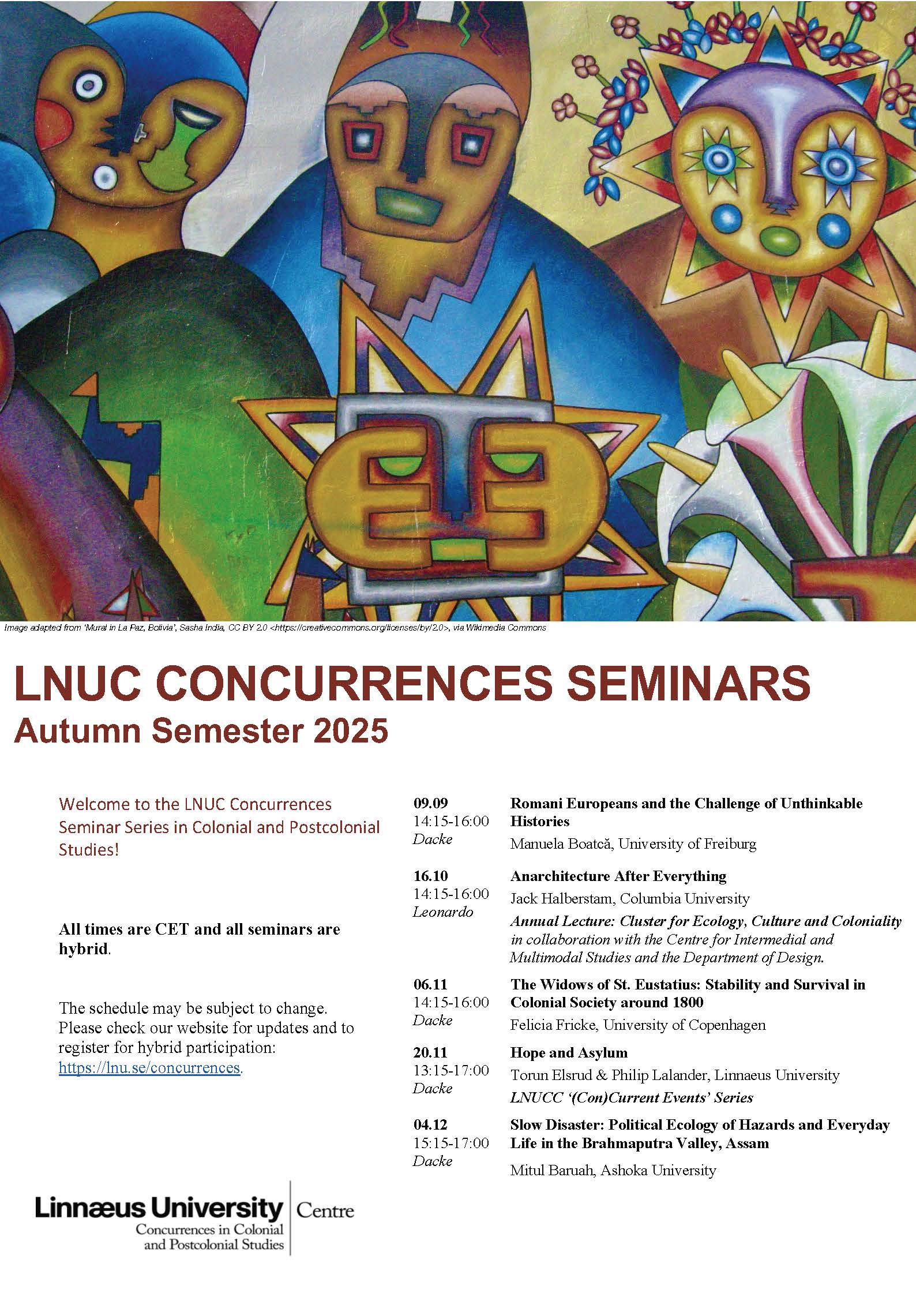Program room - KAKP2 Colonial and Postcolonial Studies, Master Programme - Växjö
Section outline
-
Welcome to the master's programme in Colonial and Postcolonial Studies!
In this room, you will find a preliminary schedule and information about the introduction week, the first week of the programme.
The programme introduction will be held on Monday, 1 September at 13:00. If you have any questions about the start of the programme, feel free to write your question in the Forum for Q&As, so everyone can read the question and answer. You are also welcome to contact us by email. The introduction week is for getting to know the programme, its organisation and ideas, and for students to meet each other and the course coordinators and other teachers. The week also includes the start of the two first courses in the programme: 'Imperialism and the Making of the Modern World' (4KP400), coordinated by Preedee Hongsaton, and 'Criticism and Theory: Current Debates in the Humanities' (4KP420), coordinated by Niladri Chatterjee.
A couple of important information points:
- All times are Central European Time (CET).
- Important administrative information: last date for registering on courses and the programme in LADOK: Sunday, 7 September.
- Where do we meet:
- On campus students: Check in TimeEdit. Note that all students enrolled in the campus programme are expected to attend on campus.
- Distance students: Zoom room in the programme room.
For the course introductions, use the Zoom rooms on the Moodle pages for 4KP400 and 4KP420 separately.
- The Programme runs in hybrid format, i.e. lectures, seminars and group-work take place live (so-called synchronised teaching) for both distance students and campus students. The instructors will connect with Zoom in the classroom, so that students both online and in the classroom participate together.
Please note that the LNU’s Introduction Week in Växjö begins with Arrival Days, 25-26 August, and Orientation Days, 27-28 August.
For issues and questions concerning administrative issues, please email the programme administrator Micael Sverkersson: micael.sverkersson@lnu.se, or the administrative office of the Faculty of Arts and Humanities: fkh@lnu.se.
With best regards,
Mike Classon Frangos and Niladri Chatterjee, Programme coordinators
-
Introduce yourself! With the help of the icon you can add photos or a video - or hyperlink to a personal or professional web-page you would like to share in this forum for programme students and teachers.
You can mention anything you want us (students and teachers) to know about you: education, personal and professional background in terms of nationality, profession or experiences, pronoun (they/their, he/his, she/her, etc.), hobbies, pets, family, favourite food, skills and talents, and whatever you think is relevant and would like us to know.
Please include a few words on why you have chosen this programme and what makes you interested in colonial and postcolonial studies!
-
- General
- Note on Sensitive Language and Slurs and in the Course Material and Classes
- Zoom
- Absence
- Generative AI: Rules and Guidelines (Important information! See also detailed instructions in each course forum - the same rules applies to all the courses).
-
Note: see the Moodle pages for 4KP400 and 4KP420 for more detailed information about each course, and TimeEdit for the complete schedules.
Monday, 1 September
13:00–15:00 Introduction to the programme (M2093 and Zoom)
In our first meeting, you will get an overview of the entire programme and its foundational ideas. You will be clued into the organisation of courses and the various administrative support systems that facilitate your studies.Tuesday, 2 September
10:15-12:00 4KP400: Course introduction (B2018 and Zoom)
Introduction to the course "Imperialism and the Making of the Modern World" (4KP400) with course coordinator Preedee Hongsaton, researcher in history. Note: distance students should use the Zoom room on the course Moodle page to join the meeting.12:15-13:00 Concurrences (B2018 and Zoom)
Prof. Liv Nilsson Stutz, Director of the LNU Centre for Concurrences in Colonial and Postcolonial Studies, a research centre of excellence at LNU, presents the centre and its activities. You will have the opportunity to engage with the Centre's seminars and fellows throughout your time at the university.Wednesday, 3 September
10:15-12:00 4KP420: Course introduction (B2018 and Zoom)
The course introduction for 4KP420: Criticism and Theory will be held with Neel. The introductory class will discuss what theory is and how to read theoretical texts with discussion and short presentations from the instructor. Note: distance students should use the Zoom room on the course Moodle page to join the meeting.13:15-15:00 SI-Session (B2018 and Zoom)
Omar Mohamed, MA student in the program from batch 2024 and SI-leader for autumn 2025, will introduce SI.Thursday, 4 September
13:15-14:00 Pedagogical support (B2018 and Zoom)
Petter Andersson from Student Affairs will present different forms of support for your studies and the Nais platform to apply for support.14:00-15:00 Social event with senior students. (in-person and Zoom)
-
The programme offers SI-PASS: Peer-Assisted Study Sessions for programme students.
Read more here:
https://lnu.se/en/student/during-your-studies/student-counselling/si-pass-peer-assisted-study-sessions/
For autumn 2025, Omar Mohamed (om222ju@student.lnu.se) from batch 2024 is the SI-leader for all courses (4KP400/410/420/430).
-
SI-PASS, Peer-Assisted Study Sessions
SI-PASS (Supplemental Instruction - Peer-Assisted Study Sessions) is an academic support model that is based on learning together with others, where students regularly meet in small study groups under the guidance of an SI leader
Watch the videos and read more about SI-PASS for the CPC MA Programme at LNU.
Omar Mohamed is the programme's SI leader in the autumn of 2024 (all four courses: 4KP400, 4KP410, 4KP420, 4KP430).
The schedule is available in TimeEdit
For any questions, please contact Omar Mohamed: om222ju@student.lnu.se
-
-
-
A blog by students in the programme (part of the course Postcolonial Encounters which runs semester 2-4).
-
CONCURRENCES SEMINARS and TALKS

During the spring semester you are enthusiastically invited to participate in the seminars organised by our Research Center Concurrences. The seminars will be held by Zoom or in Växjö throughout the spring. Please consult our exciting program covering topics such as the writings of Abdulrazak Gurnah, the climate and the environment, book releases, decolonial research methods, and much more!
A poster is forthcoming: for the time being you can access the schedule under "News and Events" > "Calender" in the LNUCC page mentioned above.
-
General information about the job market in Sweden
You can read more about different kinds of job on the Swedish Public Employment Service’s website or the website for Saco. On the latter, you can also compare wages and check prospects for different kinds of job.At LNU
If you want to discuss any queries about the future and potential occupations, you are very welcome to book a meeting with your guidance counsellor. You can also book a meeting with a career counsellor – for contact and more information, visit the webpages for the career counselling service and the Career Centre respectively.At the end of your third semester, connect with the trainee programme Smart Start. Already now read about the procedure and get in touch with potential work place and contact persons.
Pursuing doctoral studies and graduate schools
PhD positions are advertised via university job portals. You can subscribe via Swedish Public Employment Service’s website or via the individual university home pages. Do not hesitate to contact researchers and teachers with an expression of interest. Speak to the programme teachers about potential opportunities, in Sweden or abroad. In your second year, speak to your supervisor about your interest in applying for a PhD position and ask for advice according to subject and research field.

